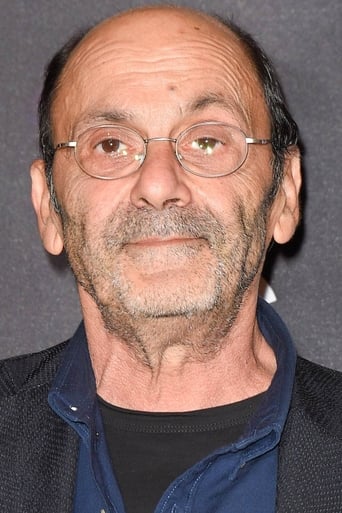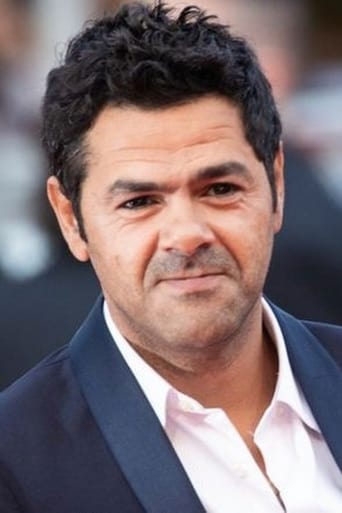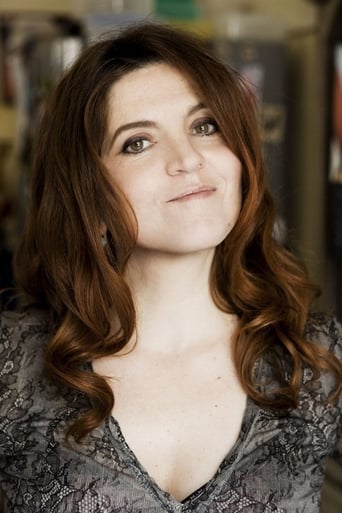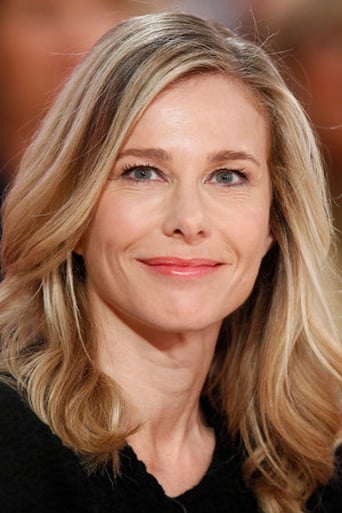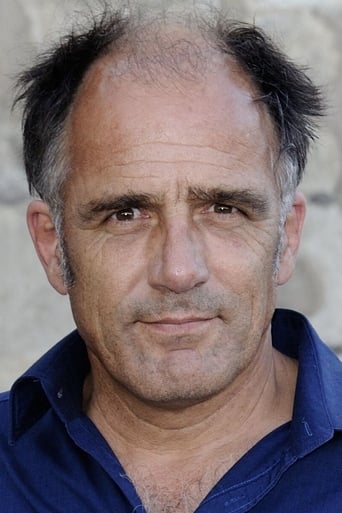Stometer
Save your money for something good and enjoyable
Beanbioca
As Good As It Gets
Baseshment
I like movies that are aware of what they are selling... without [any] greater aspirations than to make people laugh and that's it.
Mandeep Tyson
The acting in this movie is really good.
rooprect
When I say "an American opinion" I don't mean "an idiot's opinion" although that has been known to happen. No, I just mean that this is the opinion of someone whose approach to cinema is somewhat sociocentric--that here we only have access to films that are "mainstream" or, at best, foreign films that win awards at Cannes or are aggressively marketed for USA audiences. This film didn't win any awards that I know of, thus in popularity it plays second fiddle to writer/director/actress Agnès Jaoui's 2000 debut "The Taste of Others" which is similarly about the polite social & racial barriers that exist in everyday life."Parlez-moi de la pluie" (literal translation: "Speak to me about the rain") takes its title from an old French song by Georges Brassens called "L'Orage" ("The Storm"), a humorously tragic diddy about a man who has a 1-time affair with the wife of a lightning-arrester salesman during a thunderstorm. Unfortunately, the song never appears in the film although it does feature a snippet of the beautifully nostalgic "Twelfth of Never" by Nina Simone. What is the significance of the title? I'm still not sure, but the film definitely investigates the theme of covert/forbidden love and the purgatory of those who dwell in such affairs ("the other woman" or "the other man").There are 3 love stories intertwined: A filmmaker is making a documentary about a feminist activist who happens to be the sister of the woman he is having a secret affair with, while secondly, the activist is having trouble with her own love life because her boyfriend feels that her career is her only true love, and thirdly, the filmmaker's assistant is a married man growing increasingly tempted by the overtures of a young woman he knows at work. Add to the jumble the fact that the assistant is the son of the maid who has worked in the activist's home all her life, and you have a bona fide Shakespearean comedy of errors, right?Well, not exactly. And this is where my "American idiot" possibly comes in: I just didn't find the script to be very funny. The movie is listed as a comedy, so I assume I was supposed to laugh, but instead I found myself taking the situations very seriously. The funniest bits came from the filmmaker (played by Jean-Pierre Bacri) who we soon learn is a bumbling idiot behind the camera. Bacri's hushed arguments with his assistant (Jamel Debbouze, famous for his role as the grocery boy in "Amélie") were pretty funny and served to freshen things up every few minutes. Other than that, I felt like this was a pretty serious drama, heavy on interpersonal relationships and the complexities of social barriers that we impose upon ourselves. If you're ready for something like that, not a breezy comedy by any means, then you might enjoy this film.While investigating the barriers of love & marriage, the film also focuses on social/racial barriers. Here I thought the film did an excellent job due to Jamel Debbouze's brilliant acting. Since he is the son of the activist's maid, he is conventionally subordinate to her and her family, even though they are now working together as equals. His facial expressions and short words say it all, like the scene where they are all having a garden party at an immaculately set table, and his mother is serving them. Jamel refuses to sit down and doesn't eat or drink anything, though nobody seems to notice his furious defiance. Later in the film, as his oppression comes to a boil, he exposes his "employers" with a powerful monologue--not about overt racism but about the insidious mockery of civilized bigotry that the elite commit without even knowing it. It really makes you stop and look at your own life, wondering if you may be guilty of the same offense.And it's that last bit (and Jamel's memorable performance) that makes this a worthwhile film even though the comedy may fall short. Perhaps in France people understand the humor better. I do speak French but I still didn't really get any big laughs. But in the end I thought this was a nice character-driven story of everyday life. Agnès Jaoui's work has been compared to that of famed French director Eric Rohmer, and I can definitely see similarities to Rohmer's films like "A Tale of Springtime" in which simple conversations engender complicated human interactions. On the American side of the camera she reminds me of indy film darling Miranda July ("The Future", "Me and You and Everyone We Know") but without July's quirky humor. Or maybe Janoui's humor is there but I just didn't get it because I'm an American idiot ;)
richard-1787
This was a flat movie. It is, briefly, the story of two sisters, one an author/feminist who is considering going into politics, the other "just a sister," who seems just to sit at home with her boyfriend, who is sort of flat too. A has-been movie director convinces the would-be politician to sit for a series of interviews, which go poorly. In between we see a little of the director's life with his son - he is divorced and his ex has custody, so he doesn't see his son often. We see a little of the romantic/private life of the feminist, whose boyfriend feels like he has become unnecessary in her life and leaves her. We see that the two sisters evidently have some unresolved issues concerning their mother, who passed away the year before. The housekeeper also evidently has some issues with her ex, but they aren't explored either. Nothing really is, and yet this movie goes on for a long time, or so it seems.There is no real character development for any of the characters. The dialog is not interesting. The few shots of Provence are nothing special. The movie, in short, is nothing special.Flat.
Jamie Ward
Let's Talk About the Rain is about as exciting and entertaining as, well, talking about the rain. Such a discussion may warrant some interesting insights into the person you are communicating with and in turn you may learn a little about yourself, but it certainly wouldn't go on for two hours. In what would have been a much more concise and in turn, poignant project, director Agnès Jaoui makes a fine impression here but also shows a lack of restraint in her ability to know when to cut apart her work. It can be lightly amusing and uplifting, insightful and has character work that puts many of this year's features to shame, yet it also lacks any momentum, or motivation; main character Michel Ronsard would say they are the same thing, and Jaoui neglects both. In the end the director's feature comes off as an exceptional study of character but one devoid of any significance outside of its practice. From beginning to end the performances and writing establish that Let's Talk About the Rain is strictly an academic exercise in documenting. A fine piece of character study, but lacking any resounding message or clear intent, Jaoui succumbs to the astute pointlessness that too often dominates such directors' work.With little to no plot at all, Let's Talk About the Rain tells the paper thin story of a group of individuals loosely connected through family, friends and colleagues. The central figures of this collage come in the form of incompetent documentary film-maker Michel Ronsard (Jean-Pierre Bacri), his talented assistant Karim (Jamel Debbouze) and their subject; a successful politician and feminist Agathe Villanova (Agnès Jaoui). Using these characters and those around them Jaoui does well to tell an engaging story that slowly unravels the layers of dynamism between her personalities, whether it is through friendship, family, business or most importantly, love. Moving at a snail's pace from beginning to end, it's easy to get a little despondent when watching Let's Talk About the Rain go over its incessant need to analyse and document the mundane and largely inconsequential moments that these characters share, yet there are also plenty of scenes which carry with them much more finely focused intent. Such moments will usually establish the best parts of these characters through their ultimate bonding either through a smile or even a kiss, and it's here that Jaoui shows her real talent for creating resonating character drama. Unfortunately, with a plot that fails to drive anything forward, an abundance of inconsequential indulgences stops the feature from ever taking off.The strongest element of this exercise comes in the form of Jaoui and her fellow cast members who all share a nice sense of chemistry between each other, and do just as well on their own too. Jean-Pierre Bacri gets the most chuckles here, playing the bumbling but well-intentioned film-maker who is too often a slave to his eyes and those around him. Jamel Debbouze plays it close to many of his previous works, conveying the rather withdrawn but intelligent and gifted assistant to Bacri. As good as he works with Bacri however, it is his scenes with Florence Loiret (who plays as his love interest outside of a neglected marriage) that serve as key highlights, culminating in a sentimental kiss scene that carries with it an astounding amount of feeling. Jaoui herself is spot on and obviously knows the ins and outs of her character enough to complement those around her and also to give the feature a sense of purpose that is too often lacking from the script. As a whole, the entire cast give flawless performances that do the best with what they are given to work with; which unfortunately isn't that much, but fulfils the purpose that Jaoui seems to striving for.Despite the many wonderful features of Let's Talk About the Rain however, the film too often falters beneath its own weight. Heavy with character but extremely light on plot, themes or discussion, Jaoui's script too often feels imbalanced the point of stultifying irrelevancy. It's an effort that would have served much fairer on a small screen and limited to half its run time, and as such there's no denying that a lot of what goes on here is shameful navel-gazing for the sake of exercise. Leaving a screening of Let's Talk About the Rain, one is likely to have a feeling of fulfilment, but at the cost of quite a few wasted minutes. Pristine in its development of character and performances, there's a lot to love about Jaoui's latest work, but a lack of focus and point leaves the experience needlessly tiring. Followers of slow, meditative character studies will get a kick out of what is present here, but patience is certainly required and as such all but the most avid of cinephilles would be best to give this one a miss; Jaoui is speaking to a small audience here.A review by Jamie Robert Ward (http://www.invocus.net)
stenson77
Having been a huge fan of Jaoui and Bacri's films for many years, I have to admit I approach each one with a vague sense of trepidation in case they mess things up. I wasn't overly enamoured with their last film, Comme Une Image, as I felt Bacri's standard hapless-and-frustrated-but-ultimately-lovable character had become plain nasty and cruel. This time, I think they got it spot on all round. What I love about their films is that you can watch them again and again, taking something new from them with each viewing. Focusing on the minutiae of life whilst using delicate brush strokes to highlight the intricacies of human relationships via gentle but hilarious comedy is what they do best, and I found this film frequently hilarious. The actors are all superb, and the various characters give such a seemingly mundane story a depth not many films achieve, as French political life and its future are examined with a delicate touch by Jaoui, who credits her audience with much intelligence. The sight of an ambitious feminist politician leading a white middle-class man, a young French Arab and a flock of sheep down a hill, before the group get lost and are rescued by a pair of farmers, struck a chord with me, as did the relationship between Karim's mother and the bourgeois family for whom she works without being paid. There were some question marks, such as Karim's seemingly invisible wife he seemingly wants to cheat on when she herself appears affable and friendly, but overall it's a thought-provoking, entertaining and downright funny film.

